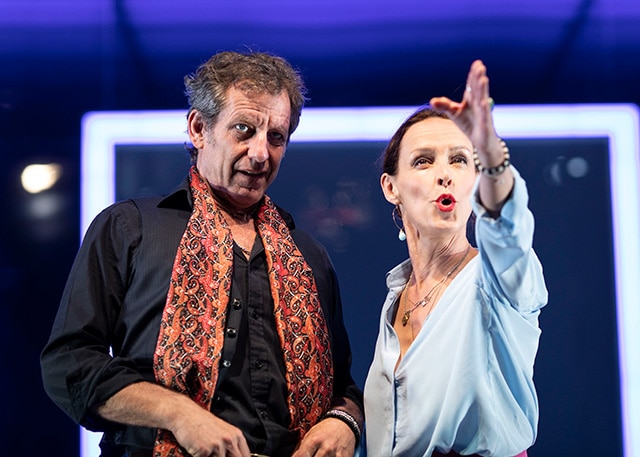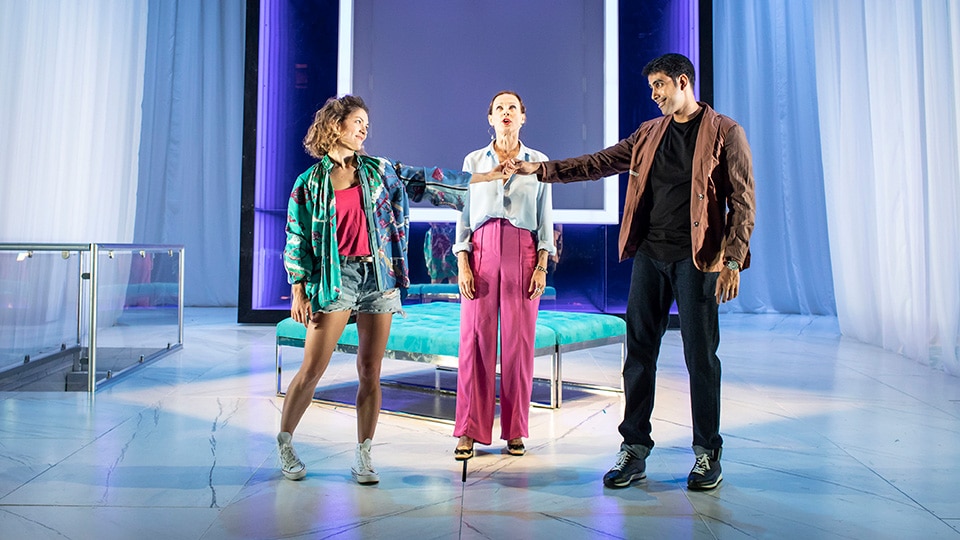I’m going to nail my colours to the mast on this. Firstly I am not bi-lingual. My French is, at best, faded GCSE. Secondly, and this is something I realised in the production’s closing minutes, I’m not a fan of the casual appropriation of serious cultural realities. Lastly, I believe theatre is at its best when you’re drawn in to its live, happening-now world. For these reasons, I found this translation of Tartuffe, and its glossy production, a challenge.
Moliere’s Tartuffe is something of a comic masterpiece, the story of a religious imposter throwing the life of a rich household into turmoil through the mind control of its master. It is a ripe attack on morality that’s tickled generations since 1664. There is good reason why it’s survived a changing society. And good reason why a production can be relevant today.
Director Gerald Garutti and translator Christopher Hampton clearly believe the play retains its power and relevance for our post-truth world. They’ve given us an update that transposes the household to the Hollywood hills, with a Tartuffe (Paul Anderson) who’s something of a lowdown Louisiana monk, all Deep South drawl and robes. The text has ditched the rhyming couplets in favour of blank verse. Some references are modern too (more to that later). All very accessible and right, so it seems, for our times. But this creative team take a further step: their Tartuffe is bi-lingual, part-French, part-English, and surtitled throughout.

It’s a brave production that chooses to honour its roots with this bi-lingual approach. In the realm of comedy, the rhythm of lines is critical. The gap between hearing and understanding, vital. Punchlines rise or die on the landing of their set-up beat. So it’s something of a risk to focus an audience on reading words rather than faces through at least half of the action. To split their attention or rely on a general understanding of the said in order to appreciate the action. What’s more, these surtitles were no light affair. Many times I missed much of the action and reactions, zipping as I was through the detailed dialogue. Nuance was lost. Laughs were small and occasional.
Then to the translation itself. Other than its wordiness, Hampton’s language often seemed at odds with the setting, using a moralising idiom that rang true for its origin but seemed strange in this L.A. of today. This also made it difficult to understand the relationships beyond the basics: father/mother, husband/wife, girlfriend/boyfriend. After Rupert Goold’s The Merchant of Venice, where every line sang out and made sense of the modernising, the bar is high for conceptual updates. Even when the reigns aren’t entirely free, much can be done. So it was disappointing to feel that the modernisation was only halfway there. The final flurry of political references only compounded the issue. Giving the ‘Deus ex machina’ moment to the American president seemed inspired. But I soon wondered who we were expected to be laughing at, and who laughing with. I found myself not laughing at all. Perhaps that was the point: the family are only saved by a leader we know to be as troubling as Tartuffe himself. It’s not supposed to be funny. Not that kind of funny. It’s supposed to make you think. But by this point, my head hurt from all the work, the reading and the concentration. I wasn’t in the mood for appreciating the attack, wherever it was aimed.

This confusion over targets wasn’t always a problem. Although satire should know its bulls-eye, there were a few moments of shifting allegiance and character complexity that played perfectly with our feelings. No more so than in the second act honey trap where Elmire, the lady of the house, drew Tartuffe on while her husband spied, seemingly unable to intervene, despite the amusing attempts of his wife to close the trap. Played to perfection by Audrey Fleurot, Elmire’s journey was something to behold and the night’s biggest success when bridging 1664 and now. As a definite nod to the #metoo landscape, it was an uncomfortable escalation of stakes. Elsewhere the characterisations were less well-drawn and, naturally, less engaging as performances. Their American transposition made little sense. Tartuffe as the villain of Trump’s America was a neat idea but oddly clothed and without the text to do anything more than display his cunning avarice, lacked punch.
This Tartuffe is a beautiful but over-challenging experiment, saved by a brilliant performance (Audrey Fleurot). My weak French couldn’t save me from the surtitles. Speed-reading couldn’t replace the comic buzz. For the bi-lingual audience members, this could well be a four-star show. For me, it earns a sad score because the critical faculties that I rely on during live performance were so often, and frustratingly, stretched.
Cast: Paul Anderson, Audrey Fleurot, George Blagden, Sebastian Roché, Olivia Ross Director: Gerald Garutti Writer: Moliere (adapted by Christopher Hampton) Theatre: Theatre Royal Haymarket Duration: 2 hours 30 mins Performance dates: 25 May – Saturday 28 July 2018


